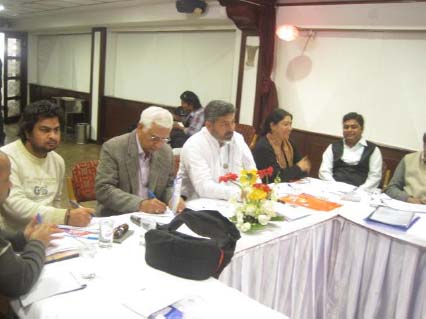Governance
India's ecological past: Review of a two volume book on environmental history in EPW
Posted on 02 Mar, 2012 02:18 PM
Utilisation of human urine as a source of nutrients for banana and maize cultivation - A compilation of research papers
Posted on 01 Mar, 2012 02:24 PMSource separated anthropogenic liquid waste (Human urine) - A potential plant nutrient for banana cultivation
In India, water problems are 'man made': Comments on the draft water policy-2012
Posted on 29 Feb, 2012 11:02 AMAuthor : Nagesh Hegde
Success of first participatory irrigation development & management programme and its further extension in Maharashtra
Posted on 27 Feb, 2012 11:33 AMAuthor : Ulhas Krishna Apte
Draft National Water Policy 2012 - Dialogue organised by NEER Foundation, Meerut on February 18, 2012
Posted on 27 Feb, 2012 10:07 AMGuest post by: Raman Kant Tyagi

Mayadantha Male (The miracle of rain) - All India Radio Karnataka programme on rainwater harvesting
Posted on 26 Feb, 2012 04:37 PM"The miracle of rain : Let the earth overflow"
Ignoring precaution, MoEF clears a project which has been categorically rejected by majority Standing Committee of the NBWL
Posted on 26 Feb, 2012 01:31 PMGuest Post : Parineeta Dandekar and Himanshu Thakkar
Water resource accounting as a tool for urban water management - An illustration in NCT- Delhi - Journal of Indian Water Works Association
Posted on 24 Feb, 2012 10:41 PMThe paper discusses the natural resources accounting in the context of national/regional policy first, and then places water resource accounting within it. Subsequently, the methodology as well as study framework adopted for resource accounting are discussed.
Inducing vulnerabilities in a fragile landscape: The implications of hydropower development in a seismically active zone - An article in EPW
Posted on 24 Feb, 2012 08:25 PMClose to 30 hydroelectric projects are being planned on the Teesta and its tributaries. Not only is this river an essential part of Lepcha identity and life, but it also flows through a fragile zone. In this article first published in the Economic and Political Weekly (EPW), Kanchi Kohli examines the ramifications of this policy.





